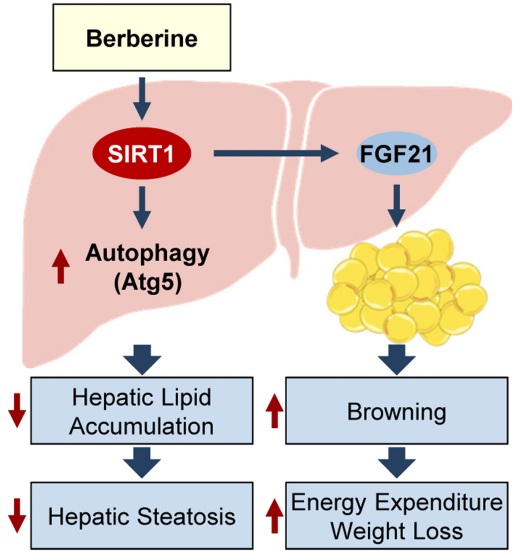Berberine, a commonly used drug in traditional Chinese medicine, has drawn increasing attention for its therapeutic potential of treating hepatic steatosis, dyslipidemia and diabetes. Although pharmacological studies have demonstrated therapeutic actions of berberine on hepatic steatosis and obesity, the underlying mechanism of berberine on lipid metabolism remains poorly understood.
In collaboration with Dr. GAO Xin at Zhongshan Hospital of Fudan University, a team of scientists led by Professor LI Yu from Shanghai Institutes for Biological Sciences, CAS provided both animal and in vitro evidence showing that berberine induces autophagy to ameliorate hepatic steatosis in a Silent Information Regulator 1 (SIRT1) dependent manner in the liver of mice under nutrient overload or in response to fasting. Moreover, berberine’s regulation of Fibroblast Growth Factor 21 (FGF21) and energy expenditure may represent a molecular mechanism by which pharmacology administration of berberine protects against obesity.
In this study, scientists utilized the in vivo and in vitro methods, which include the studies using liver-specific SIRT1 knockout mice in response to dietary overload or fasting treatment, SIRT1-/- hepatocytes and mouse embryonic fibroblasts (MEFs), and human HepG2 hepatocytes, to demonstrate that SIRT1 is critical for berberine of controlling hepatic lipid metabolism and maintaining whole body energy expenditure.
The study revealed that administration of berberine enhances systemic energy expenditure and ameliorates obesity. Hepatic SIRT1 is required for berberine-induced production of FGF21. Scientists also discovered that berberine stimulates autophagy to ameliorate hepatic steatosis in mice. SIRT1 is required for berberine’s effects on activation of autophagy in mice under diet-induced obesity or in response to fasting.
These studies also highlight the therapeutic relevance of targeting hepatic SIRT1-autophagy axis to reverse hepatic lipid deregulation and improve lipid homeostasis in obesity and type 2 diabetes.
This work was published online in British Journal of Pharmacology on 2017 Oct 24 as a research article entitled “Berberine Attenuates Hepatic Steatosis and Enhances Energy Expenditure in Mice by Inducing Autophagy and Fibroblast Growth Factor 21”. This study was funded by the grant from National Key Basic Research Program of China, National Natural Science Foundation of China and the Hundred Talents Program of the Chinese Academy of Sciences.
Contact:
LI Yu, Ph.D.,
Professor
CAS Key Laboratory of Nutrition and Metabolism,
Shanghai Institutes for Biological Sciences (SIBS), Chinese Academy of Sciences
320 Yue Yang Road
Life Science Research Building A1816, Shanghai, China 200031
Tel: +86 (21) 5492 0753
Email: liyu@sibs.ac.cn
Web: http://www.nutrition.ac.cn/e_PI_liy.asp
http://www.lilab.com.cn/

The proposed model for SIRT1 in mediating berberine's effects on improving hepatic steatosis and obesity in diet-induced insulin resistant mice.
(Image provided by Dr. LI Yu’s laboratory)

